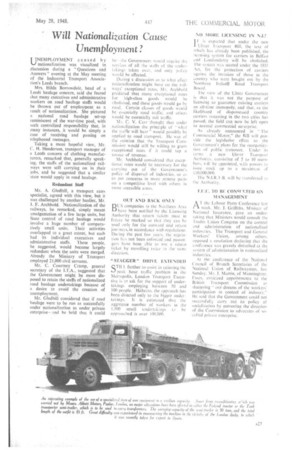Will Nationalization Cause
Page 29

If you've noticed an error in this article please click here to report it so we can fix it.
Unemployment?
UNEMPLOYMENT caused by nationalization was visualized in discussion during a "Questions and Answers" evening at the May meeting of the Industrial Transport Association's Leeds branch.
Mrs. Hilda Borrowdale, head of a Leeds haulage concern, said she feared ihat many executives and administrative workers on road haulage staffs would be thrown out of employment as a result of nationalization. She pictured a national road haulage set-up reminiscent of the war-time pool, with such centralized responsibility that, in many instances, it would be simply .a case of receiving and passing on telephoned messages.
Taking a more hopeful view, Mr. C. H. Henderson. transport manager of a Leeds concern of clothing manufacturers, remarked that; generally speaking, the staffs of the nationalized railways were still carrying on in their lobs, and he suggested that a similar state would apply in road haulage.
Redundant Staff Mr. A. Gledhill, a transport rates specialist, agreed with this view, but it was challenged by another haulier, Mr. I. F. Archbold. Nationalization of the railways, he remarked, simply meant amalgamation of a few large units, but State control of road haulage would involve a huge number of comparatively small units. Their activities overlapped to a great extent, but each had its individual executives and administrative staffs. These people, he suggested, would become largely redundant when the units were merged. Already the Ministry of Transport employed 21,000 civil servants.
Mr. C. .Courtney Cramp, general secretary of the I.T.A., suggested that the Government might bp more disposed to retain the staffs of nationalized road haulage undertakings because of a desire to avoid the creation of unemployment.
Mr. Gledhill considered that if road haulage were to be run as successfully under nationalization as under private enterprise—and he held that it could
be---the Government would require the services of all the staffs of the undertakings taken over, and only policy would be affected.
During a discussion as to what effect nationalization might have on the railways' exceptional raies, M r. Archbold predicted that many exceptional rates for high-class goods would be abolished, and these goods would go by road. Certain classes of goods would be essentially road traffic, and others would be essentially rail traffic.
Mr, C. V. Carr thought that under nationalization the principle of " what the traffic will bear" would possibly be applied to road transport. He was of the opinion that the Transport Com mission would still he willing to grant exceptional rates if it could lap a source of revenue.
Mr. .Archbold considered that exceptional rates would be necessary for the
carrying out of the Government's policy of dispersal of industries, so as If pitt concerns in more remote parts on a competitive level with others in more accessible areas.
OUT AND BACK ONLY
Bus companies in the Northern Area have been notified by the Licensing Authority that 'return tickets Must in future be marked so that they can be used only for the outward and return journevs,in accordance with regulations. During the past few years. the regulation has not been enforced and passengers have been able to Ilse a return ticket by travelling twice in the same direction,
" STAGGER" DRIVE EXTENDED
ST1LI, further to assist in relieving the peak hour traffic problem in the Metropolis, London Transport Executive is to ask for the support of undertakings employing between 50 and 100 people. Hitherto, the approach has been directed only to the bigger Undertakings. It is estimated that the aggregate number of v,orkers in the 1.500 small undertakings lo he approached is over 100,000. NO MORE LICENSING IN Ni IF is expected that under the new
Ulster I ransport Bill, the text of which has already been published, the licensing system for carriers in Belfast and Londonderry will be abolished. 1 he system was started under the 1935 Act, for the protection of carriers against the invasion of those in the cotintry who were bought out by the Northern Irelant1 Road Transport Boa rd.
The view of the Ulster Government is that it was not the purpose of licensing to guarantee existing carriers an all-time monopoly, and that, as the likelihood of dispossessed country carriers restarting in the two cities has passed, the field can now be left open to normal commercial enterprise.
As already announced in The Commercial Motor." the Bill will provide the legislative effect to the Government's plans for the reorganization of public transoort. Under its terms a new UISter Transptw Authority. consisting of 5 to 10 members, will be appointed, with flowers to issue stock up to a maximum of f.
10.000.000.
The N.I.R.1 .B. will be transferred to the Authority.
T.U.C. TO BE COMI'll,TED MANAGEMENT
AT the Labour Party Conference last week, Mr. J. Griffiths, Minister of National Insurance, gave an undertaking that Ministers would consult the .Frades Union Congress on the control and administration of nationalized industries. The Transport and General
Workers' 1. Th i on, among others, opposed a resolution declaring that the conference was gravely disturbed at the system of administration in nationalized in
At the conference of the National Council of Branch Secretaries of the National Union of Railwaymen, last Sunday. Mr. J. Martin, of Manningtree. Essex, criticized appointments to the Brilish Transport Commission as shattering " our dreams of the workers' participation in control of industry." He said that the Government could not successfully carry out its policy of socialization by entrusting the direction of the Commission to advocates of socalled pi.ivaie enterprise.




















































































